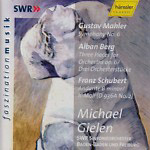Michael Gielen’s Mahler Sixth is a grim affair indeed. Setting off with a relentlessly heavy tread, Gielen leads a first movement that is the very opposite of the athletic pacing of Bernstein and Karajan, rather closer to Barbirolli and Chailly at the other extreme. Barbirolli is slowest of all, and his Philharmonia lacks the SWR Orchestra’s bright coloring, which Gielen masterfully uses to stress the music’s anguish (and also its temporary relief, as in the tranquil interlude). It’s only when turning to the Chailly that you notice how much more energy and vitality is to be found in the score, even at this tempo (listen to the crackling electricity of the Concertgebouw trumpets). The scherzo (also at a slow pace) displays even more reticence–not once do the climaxes shriek the way they do with Bernstein, Bertini, or Neumann. Gielen does render the gentle first trio with much beauty of phrase, but the transition to the second is marred by the timpani’s half-step sharp mistuning.
With the Andante this performance really hits its stride, moving at a more flowing pace, and calling forth warm and bucolic playing from the orchestra. Gielen builds a magnificent climax that emerges like a sudden sunrise clearing all before it as the horns toggle higher and higher. Best of all is the finale. It’s as if Gielen bet the house on this one movement, and won. The opening is disturbingly gloomy (though not scary like Bernstein and Chailly), and the march moves forward with strong momentum, wonderfully accented by the insistent sideline carping of Mahler’s polyphonic figurations, which fully register at this measured tempo. Gielen brings a highly emotional sweep to the lyrical second subject (evoking memories of Tennstedt’s pain-etched reading with the London Philharmonic), and by playing up these temporary moments of euphoria he underlines the inevitable tragedy that follows. And the hammer blows? Awesome! Solid, sharp, deep, and with tremendous impact thanks to Hänssler’s bracingly vivid recording.
Alban Berg’s Three Pieces for Orchestra receives a spectacular performance, joining with Karajan’s as one of the best available. Gielen recreates the highly charged atmosphere of the Mahler (perhaps to underline the two works’ connections) and leads the SWR players in an arrestingly virtuoso performance (especially of the frenzied finale). Last comes the Adagio from Schubert’s uncompleted Tenth symphony. By its inclusion here we are asked to hear the roots of Mahler in Schubert’s late style. But what you really hear is some rarified and refined Schubert, making you curious about the rest of the symphony. (If only Philips would release its Marriner recording!) This beautifully played movement caps one of the more compelling Mahler releases this year.
































